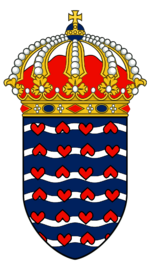Emerstarian Empire: Difference between revisions
mNo edit summary |
mNo edit summary |
||
| Line 1: | Line 1: | ||
{{wip}} | |||
{{Infobox country | {{Infobox country | ||
|conventional_long_name = Emerstarian Empire | |conventional_long_name = Emerstarian Empire | ||
Revision as of 00:20, 2 June 2019
This article is incomplete because it is pending further input from participants, or it is a work-in-progress by one author. Please comment on this article's talk page to share your input, comments and questions. Note: To contribute to this article, you may need to seek help from the author(s) of this page. |
Emerstarian Empire Emerskvaldett (Emerstarian) | |
|---|---|
| Motto: "Frömhedt, Frihedt, Rikehedt" "Piety, Liberty, Country" | |
| Anthem: "Regel Emerige" "Rule Emerstari" | |
 Map of Emerstari's 17 states and capital district | |
| Capital | Rensulier • Kalamer |
| Largest city | Yoerk |
| Official languages | Emerstarian |
| Recognised regional languages | |
| Demonym(s) | Emerstarian • Emer |
| Government | federal parliamentari constitutional monarchy |
• Monarch | Eric XII Georg |
| Frederik Månssen | |
| Lorens Fjellborg | |
| Legislature | Kejserdomssamling |
| Kejserdomsråd | |
| Representantskammer | |
| History | |
• The Canari Islands are colonized. | 1471 |
• Christoffer Ljundstrom discovers Kophavien. | 1504 |
• Canaria enters into a personal union with Emerstari. | 1672 |
• New Retermi votes to leave the Emerstarian Empire | 1947 |
| 2016 | |
| Population | |
• 2018 estimate | 232,910,091 |
• 2015 census | 232,012,390 |
| Currency | Shilling ( Ṩ) (SHI) |
The Emerstarian Empire comprises of the dominions, colonies, protectories, mandates, and other territories ruled or administered by Emerstari. It originated with the overseas possessions and trading posts of Emerstari established in the late 15th century and early 16th century. At its height, the Emerstarian Empire was one of the largest empires in history. In 1900, covered roughly 12,000,000 square miles and held sway over 125,000,000 people. As a result, its political, legal, linguistic, and cultural legacy is widespread.
During the Eurevian Rebirth, Emerstari, Canaria, and Venezia pioneered Eurevian exploration, and in the process established large empires. In the late 17th and early 18th century, a series of wars allowed Emerstari to expand considerably near home. By the middle of the 18th century, Emerstari emerged as the principal naval power in Eurevia and expanded its overseas empire.
In the early 19th century, the Industrial Revolution began to transform Emerstari and the Emerstarian Golden Age began. Except for the end of the Emerstarian-Canarian personal union in 1823, the borders of the empire changed little during the Golden Age. Due to the effects of industrialization, Emerstari's population increased rapidly and there was dramatic urbanization, which caused social and economic stress. By the turn of the century, [[Emerstarian Arasland] left the empire and joined the Green Union.
By the start of the 20th century, tension arose between the powers of Eurevia due to economic and political factors, resulting in the 10 Years' War (1911-1921). The war placed much strain on the military, financial, and manpower resources of Emerstari, and shortly after the war, the Emerstarian Golden Age ended with the Scanian Depression. Following the depression was the Era of Decolonization wherein copious colonies were granted independence, most prominently New Retermi. Thirty-four territories remain under Emerstarain rule.
After independence, many former colonies of Emerstari joined the Emerstarian Commonwealth: An association of 12 independent nations that share a monarch, currently Eric XII Georg.



